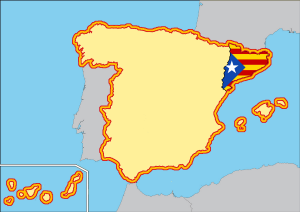
Map of Spain, showing Catalonia filled with the unofficial independence flag. Source: own elaboration.
The situation in Catalonia is very tense. In September 2015, pro-independence parties gathered only 47.8% of the vote but managed to achieve a majority in the regional parliament. Based on this result and the perceived popular support, they started a process later that year that would involve holding a referendum and, if successful, would end in secession from Spain. However, the opposition in Catalonia and the central government oppose this move, and the Constitutional Court has suspended the resolution on independence, since it violates the Constitution.
Beyond the legal complications, there are deeper problems with Catalan nationalism. On the one hand, the concept of nationhood they found their claims on is deeply flawed. Nations are arbitrary groupings of people, with no more relevance than race. Although individuals might be more comfortable with a specific culture, it is foolish to impose such a notion from above onto them. On the other hand, the referendum has practical problems. Even if it succeeds, significant areas could vote against it. Indeed, looking at the 2015 elections reveals that in several municipalities —most notably Barcelona— the opposition parties were stronger. If this happens, a hypothetical Catalan Republic will have a serious problem with the areas that want to remain in Spain. As the referendum will take place against the law, it will become impossible for Catalonia to argue against further secession from itself.
Dark red indicates pro-independence parties achieving over 50% of the vote; the opposite is true of the lighter colour. Coincidentally, the coastal strip is densely populated, whereas the darker areas are mostly rural. Source: ABC.es
There is also a problem in the proposed way to achieve secession. It is widely accepted that, when laws are perceived as unjust, civil disobedience is something free citizens are entitled to engage in; however, in this case it is the state itself that is attacking the rule of law. How can it claim legitimacy and political authority when it is simultaneously infringing upon the Constitution and ignoring the government and the courts, the very pillars of democracy? That said, I do not think the central government should prevent the referendum by all means, even though they are legally entitled to do so, because that would violate the principle of the consent of the governed, essential for any decent democratic system. Rather, they should only stop it if, immediately afterwards, they amend the Constitution and agree to hold a vote legally.
Demonstration in London in support of independence for Catalonia. Source: Pinterest.com
One is tempted to assert, given the flawed arguments and the problematic outcome, that there is no case for independence. There are, however, both a sound argument for it and a better way of implementation. Independence can be justified on several political principles, beyond the misleading notions of collective rights of a people, the Catalan nation, or a supposed shared identity. Firstly, consensual relations; the consent of the people should be sought as far as possible, as the opposite would involve a dangerous authoritarianism. Secondly, representativity; the greater the autonomy of a region, the more representative it is, since the votes of any individual or group count more as a fraction of the total. Thirdly, accountability; due to stronger incentives, enhanced competition with neighbouring lands and proximity between the state and the people, governance improves as the size of political units decreases. These three principles, consent, representativity and accountability, are essential features of a well-functioning liberal democracy and conducive to a free, open society.
The alternative for the materialisation of a referendum should avoid the outlined problems. It should first and foremost be legal, following a constitutional reform and an agreement between the central and regional governments. Secondly, it should allow the areas that want to remain in Spain to do so and enable the secession of smaller political units. The answer for both would be to require a popular initiative for a referendum to take place at any level —region, province or municipality— and make the results count at the lowest level. Thus, if some towns prefer to remain while the rest of the region wants independence, both can get what they want.
It may seem an unstable and chaotic mechanism, but nothing is further from the truth. In fact, where allowed, referendums are paradoxically uncommon, and secession, even more so. Quebec has had two independence referenda, both unsuccessful; several US states allow secession to form a new state, with only four cases, all before the 20th century; Liechtenstein declares in its Constitution the right of all municipalities to secede, with no attempts since it was passed. The key lies in the strong incentive to provide good policies that the mere possibility of secession creates. Furthermore, although independence of regions is feasible, local secession is unlikely and, if it happens, there are two advantages: the potential damage is limited and easily reversible, and it sets a discouraging example, acting as a deterrent. The negative impact of secession creates a negative feedback loop, so that any attempt makes future attempts less likely, bringing robustness and stability.
I do, however, still oppose full-blown independence, the creation of yet another divisive border. Those of us who believe remaining is better, have a simple way of furthering our position: make remaining a more appealing option. We can and should get the best of both worlds, by retaining a political union but allowing decentralisation. The idea would be a democratic confederation, where the central government coordinates defence, diplomacy and ensures there are no borders within the territory, while activities such as taxation and provision of services are regionally or, better still, locally managed.
Hopefully, the conflict in Catalonia will stir the Spanish government and force them to pursue changes in the political administration of the country. With a bit of luck, these changes could be a step in the direction I have outlined. Indeed, some of the largest parties are calling for federal reform and the formation of a “nation of nations”. Let change happen, let freedom prevail.
Picture: Creative Commons Oscar Miño Peralta
This article was first published on Rafael’s Medium profile.
This piece solely expresses the opinion of the author and not necessarily the organization as a whole. Students For Liberty is committed to facilitating a broad dialogue for liberty, representing a variety of opinions. If you’re a student interested in presenting your perspective on this blog, you can submit your own piece to [email protected].



